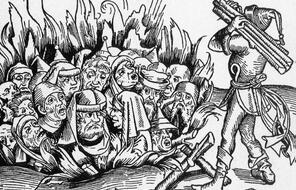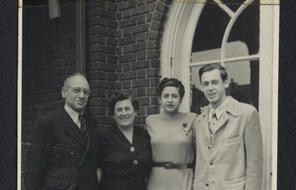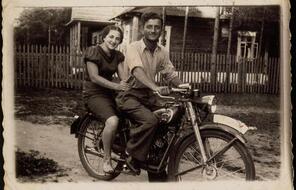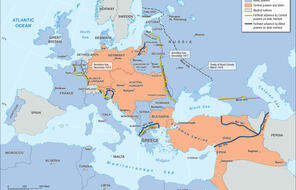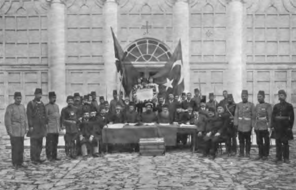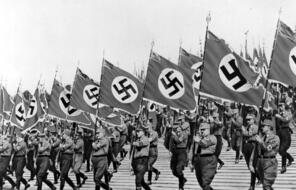The Business of Slave Labor
At a Glance
Language
English — USSubject
- Civics & Citizenship
- History
- Social Studies
- Human & Civil Rights
- The Holocaust
Albert Speer, Hitler’s favorite architect, was among the 22 Nazi leaders tried at the first Nuremberg trial. He had also been minister of armaments and munitions, a position that included the responsibility for assigning prisoners to prisoner-of-war, labor, and concentration camps. At the trial, Speer depicted himself as unaware of what had happened in the camps, and he described his partnership with Hitler as a pact with the devil. He told the tribunal, “The trial is necessary. There is a common responsibility for such horrible crimes, even in an authoritarian system.” He insisted, however, that he could not be held accountable for the death camps because he did not know they existed.
Speer’s testimony, along with records kept during the war by the Nazi government, led to the indictments at subsequent trials of other people—especially German businessmen who had used slave labor from the camps Speer administered—for war crimes and crimes against humanity. Among them were the top officials at I. G. Farben Company, the largest chemical company in the world at the time. Their indictment stated, in part:
Farben, in complete defiance of all decency and human considerations, abused its slave workers by subjecting them, among other things, to excessively long, arduous, and exhausting work, utterly disregarding their health or physical condition. The sole criterion of the right to live or die was the production efficiency of said inmates. By virtue of inadequate rest, inadequate food . . . many died at their work or collapsed from serious illnesses they contracted. With the first signs of a decline in production of any such workers, although caused by illness or exhaustion, such workers would be subjected to the well-known “Selektion.” Selektion, in its simplest definition, meant that if, upon a cursory examination, it appeared that the inmate would not be restored within a few days to full productive capacity, he was considered expendable and was sent to the “Birkenau” camp at Auschwitz for the customary extermination. 1
Twelve officials from Krupp, a major German arms manufacturer, were also put on trial for war crimes and crimes against humanity. At that trial, a man who had been forced to work for Krupp testified, “We were not slaves but less than slaves. We were deprived of freedom and became a piece of property which our masters drove to work. But here all similarity with any known form of slavery ends. . . . The machinery had to be operated with care, oiled, greased, and allowed to rest; its life span was protected. We, on the other hand, were like a bit of sandpaper, which, rubbed a few times, becomes useless and is thrown away to be burned with the garbage." 2
Benjamin Ferencz, who was an American prosecutor at Nuremberg, noted:
Well over half a million inmates were leased out by the SS to hundreds of German firms by the end of 1944. The workers included Germans . . . , Communists, Socialists, other political opponents of the Nazi regime, priests, Seventh Day Adventists, as well as homosexuals, “asocials,” and common criminals. . . . As a class, there can be no doubt that the Jews suffered most of all, but in focusing on their claims, I have not wished to minimize the suffering of all the others. . . . Jews were regarded as contagious vermin by their Nazi oppressors, and were treated accordingly. They were given the most strenuous and most dangerous work. Jews who could not work were either dead or about to die. 3
Ferencz pointed out that although some industrialists were tried and convicted, most were free within a few years and richer than ever. Although some survivors sued German companies, settlements were very small.
After several decades had passed, some German companies hired professional historians to investigate their cooperation with the Nazis. In the late 1990s, Deutsche Bank, a major German bank, accepted “moral responsibility” for purchasing gold taken from concentration camp victims. 4 In the years since Deutsche Bank’s admission, other German companies, including automakers Volkswagen, Audi, and Daimler, have commissioned investigations into their past ties with the Nazis and admitted their use of slave labor.
Connection Questions
- Albert Speer claimed that no industrialist was ever forced to use concentration camp labor, and there is considerable evidence to support his claim. Why, then, did many choose to do so?
- In what ways were the leaders of companies like I. G. Farben and Krupp participants in the Holocaust?
- Some companies that collaborated with the Nazis and used slave labor continue to operate today. Some, including Volkswagen, Deutsche Bank, and Bayer, contributed to a fund that pays reparations to those who were forced into slave labor and also supports educational programs. How else should companies that collaborated with the Nazi regime acknowledge and respond to this history today?
- Speer is often viewed as the only Nazi at Nuremberg to admit his guilt. But, late in his life, after he served a 20-year prison sentence, he said, “I did not admit guilt—I said I was responsible." What do you think he meant by this? Is there a difference between guilt and responsibility?
- 1Trials of War Criminals Before the Nuremberg Military Tribunals Under Control Council Law No. 10, Nuremberg, October 1946 – April 1949: Case 6, U.S. v. Krauch (I. G. Farben Case), quoted in Benjamin Ferencz, Less than Slaves (Cambridge: Harvard University Press, 1979), 191.
- 2Trials of War Criminals Before the Nuremberg Military Tribunals Under Control Council Law No. 10, Nuremberg, October 1946 – April 1949: Case 6, U.S. v. Krauch (I. G. Farben Case), quoted in Benjamin Ferencz, Less than Slaves (Cambridge: Harvard University Press, 1979), 191.
- 3Trials of War Criminals Before the Nuremberg Military Tribunals Under Control Council Law No. 10, Nuremberg, October 1946 – April 1949: Case 6, U.S. v. Krauch (I. G. Farben Case), quoted in Benjamin Ferencz, Less than Slaves (Cambridge: Harvard University Press, 1979), 191.
- 4John Schmid, “Deutsche Bank Says It 'Regrets' Nazi Deals,” New York Times, August 1, 1998, accessed June 8, 2016.
How to Cite This Reading
Facing History & Ourselves, "The Business of Slave Labor," last updated August 2, 2016.

